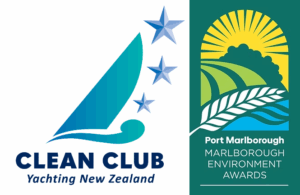As we wrap up Clean & Green Corner for 2024, I wish you all a safe and joyful holiday season on the water with loved ones. Before we dive into the festivities, let’s remember to preserve our beautiful environment for future generations by being mindful and sustainable in our celebrations.
Avoid plastic waste while boating. Many packaged foods are encased in plastic, which can end up polluting our waters and harming marine wildlife. To help combat this, consider buying food in bulk and using reusable, durable stainless steel containers that are free from plastic.
To minimize trash, plan ahead and stock up on reusable items like water bottles, coffee mugs, cutlery, and napkins for everyone on board. Say goodbye to single-use plastics like bottles, utensils, and straws that contribute to ocean pollution. Be wary of products posing as eco-friendly, such as “paper” plates, “plant-based” plastics, and “biodegradable” wipes, which often don’t live up to their claims. For instance, many “paper” plates are plastic-coated, and “plant-based” plastics aren’t truly biodegradable. Also, most wipes contain plastic fibers and won’t decompose. Remember, green boating is a collective effort.
During your captain’s briefing, inform your family and guests about your eco-friendly practices. Make it clear that waste won’t just biodegrade if it’s tossed overboard. Designate spots for recyclables like glass, metal, and clean paper, and label the bins clearly. Do the same for trash—have a labeled bag or bin that’s easy to take off the boat for proper disposal on land.
Choose personal care and cleaning products that are non-harming for marine life.
When showering on the boat, opt for biodegradable soaps and shampoos instead of those with harmful chemicals. Choose sunscreens free from damaging substances, as some can adversely affect marine life and coral reefs; mineral-based options like zinc oxide or titanium dioxide are preferable. For boat cleaning, use non-toxic products like vinegar and baking soda. Steer clear of harsh chemicals such as bleach to prevent harming aquatic life. Select personal care items without microbeads, which are small plastic particles that can pollute our oceans and endanger marine species. Lastly, use environmentally friendly laundry detergents.
Be mindful of marine wildlife, protected areas and the seabed.
Numerous regions are set aside as protected zones to serve crucial purposes like offering a sanctuary for endangered wildlife or conserving natural habitats. It’s important to steer clear of these areas as well as mussel farms and salmon pens while boating and to not interfere with marine life.
Most of our members are fans of our moorings, although anchoring remains an increasingly popular choice. It’s crucial to anchor responsibly to safeguard the seabed, as poor anchoring can severely damage it. If anchoring feels a bit tricky, don’t hesitate to ask our experienced skippers for tips. Anchoring, like any boating skill, gets better the more you do it. If you’re still feeling uncertain, Marty and his team of volunteers are always ready to help you sharpen your technique.

